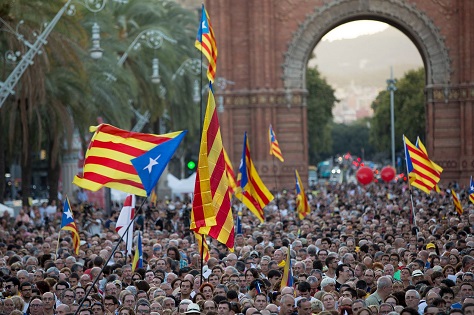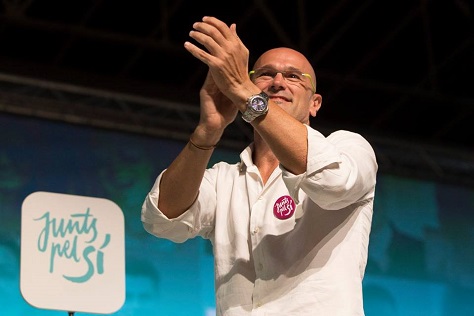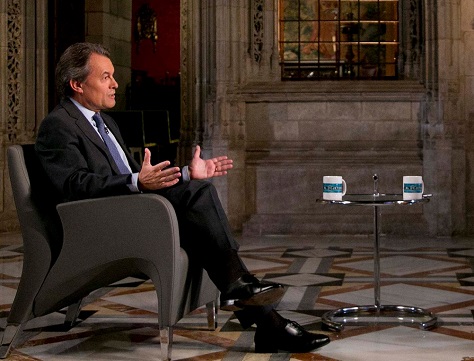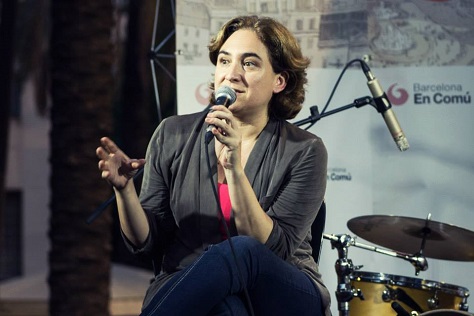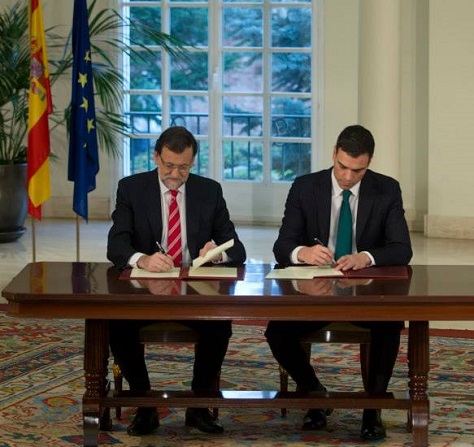If September 2014 was the month when Scottish independence made global headlines, it might be September 2015 when Catalan independence has its breakthrough — at least if regional president Artur Mas has his way. ![]()
![]()
Barely 10 months after Catalonia’s regional government held a non-binding referendum on independence, and just three months before the Spanish general election, Catalan voters will elect a new regional parliament in a campaign that Mas has been waging for months as a de facto referendum on the region’s future status within — or outside of — Spain.
Mas, the presidential candidate of the cross-ideological Junts pel Sí (Together for Yes) coalition, argues that a victory for the pro-independence forces will give him the leverage he needs to demand negotiations with Spain’s central government. Spain’s conservative prime minister Mariano Rajoy, however, has steadfastly refused to discuss autonomy with Mas, let alone an independence referendum. Rajoy contends that any independence process is illegal, and Spain’s constitutional court ruled that last year’s November referendum was illegal. Though Mas backed down and canceled the vote, he nevertheless provoked Madrid by holding a non-binding plebiscite to flex the muscles of the Catalan independence movement. In turn, Rajoy’s refusal to discuss the matter or even permit an in-out referendum has alienated Catalan voters who might not otherwise be enthusiastic about independence.
* * * * *
RELATED: Can Felipe VI do for federalism
what Juan Carlos did for democracy?
* * * * *
At face value, Catalans are merely going to the polls on September 27 to elect the 135 members of the regional parliament. But after the Greek eurozone showdown earlier the summer threatened the eurozone’s stability and split Europe’s north and south, and even as the ongoing refugee crisis is threatening the integrity of the borders-free Schengen zone, splitting Europe’s west and east, the cause of Catalan independence could become the European Union’s next fashionable crisis.
Mas promises that if the Catalan electorate gives Junts pel Sí a majority in the Catalan parliament, however narrow, it will be sufficient to launch an 18-month process that will result in the region’s independence and promulgate a new Catalan constitution.
So what exactly is happening in Catalonia? And what should we expect the day after regional elections?
1. Not all Catalans buy into the notion Sunday’s vote is a de facto referendum
It’s true that the cause of Catalan independence has shaped the campaign from the moment Catalan regional president Artur Mas announced way back in January that we would call snap elections.
Since July, when Mas formed his pro-independence coalition, scrambling long-held alliances in the region’s politics, it has commanded between 35% and 41% of the voting electorate in opinion polls, which means that it will, by far, lead the other parties after Sunday’s votes are counted. Aside from Mas’s Convergència Democràtica de Catalunya (CDC, Democratic Convergence of Catalonia), the coalition includes the chief pro-independence party of the Catalan left, the Esquerra Republicana de Catalunya (ERC, Republican Left of Catalonia) and several other groups.
Though Mas (and not the ERC’s leader Oriol Junqueras) will remain regional president if the coalition wins a majority in the Catalan parliament, it’s the bespectacled Raül Romeva (pictured above), who has led the ‘Sí’ coalition for the past three months. A former member of the European Parliament for the Catalan greens and a policy specialist with experience at UNESCO and Oxfam, Romeva is a popular figure. He lacks Mas’s baggage as a sitting president or Junqueras’s baggage as a hard-left politician. But he withered under the pressure of a BBC interview earlier this month, stumbling over questions about Catalan separatism in a clip that’s gone viral in the region and beyond:
Romeva and his coalition’s problem is that four additional parties each attract another 9% to 15% of the vote, and they all favor the region staying put within Spain, at least to varying degrees:
- The conservative Partit Popular de Catalunya (PPC, the People’s Party of Catalonia), the local branch of Rajoy’s national center-right party;
- The center-left Partit dels Socialistes de Catalunya (PSC, Socialists’ Party of Catalonia), the countervailing affiliate of Spain’s opposition Socialists;
- Ciutadans/Ciudadanos (‘Citizens’ or just the ‘C’s’), a liberal Catalan party formed in 2005 that staunchly favors a strong Spanish state and that, over the past year, has emerged as a national force in Spanish politics; and
- Catalunya Sí que es Pot (Catalonia Yes We Can), a leftist coalition that incorporates supporters of the newly-formed, anti-austerity Podemos, the Catalan greens and other alternative leftists — sympathetic to greater Catalan autonomy but more interested in reversing the deficit-reducing policies that both Rajoy and Mas have implemented in past years.
For many of these parties’ supporters, independence is not the most important issue, and the election is not just a referendum on constitutional issues. Indeed, if these four parties together surge and win a majority in the Catalan parliament, they could potentially form a bulwark against Mas’s pledge to force a showdown on sovereignty.
It might be that yet another pro-independence party, the leftist Candidatura d’Unitat Popular (CUP, Popular Unity Candidacy) would support a pro-independence government’s efforts. But Mas already led a government that, with ERC’s support, essentially commanded a pro-independence majority in the Catalan parliament following the 2012 elections, when Catalonia’s status also ranked as a top issue. Aside from the pageantry of a new mandate, Mas didn’t necessarily need to call snap elections just 26 months later.
2. Mas’s (and the CDC’s) commitment
to independence is still unclear
Mas’s big play for independence was sufficient to destroy the coalition that has dominated Catalan government since the end of the Franco-era dictatorship. That coalition, Convergència i Unió (CiU, Convergence and Union), has since 1978 joined the region’s two center-right parties — Mas’s larger, more liberal and more pro-independence CDC and the smaller, Christian democratic and pro-autonomy Unió Democràtica de Catalunya (UDC, Democratic Union of Catalonia).
But some of the greatest doubts about Catalan independence stem from the CDC’s record governing the region. Jordi Pujol, its longtime leader, and the Catalan president from 1980 to 2003, is the subject of a massive corruption inquiry, and Pujol has personally admitted to keeping several offshore bank accounts. There are whispers that Mas is just as corrupt as Pujol was. Mas was slow to embrace the independence cause, and there’s some suspicion that he did so in 2012 only to bolster his personal political support at a time when scandal and recession otherwise destroyed his popularity.
Needless to say. when the leading force in Catalan politics in the democratic era seems so thoroughly corrupted, it should give some pause to even the most earnest advocates of Catalan independence — and cause them to wonder if Mas (pictured above) and the CDC are manipulating the cause solely to extend a corrupt empire that uses sovereignty as a smokescreen.
Nevertheless, sniping between Madrid and Barcelona has intensified in the months leading up to the election. Mas threatened earlier this week that an independent Catalonia would walk away from its share of the Spanish national debt, in response to a warning from Bank of Spain governor Luis María Linde that a Catalan crisis could, in turn, threaten a run on banks and require capital controls or other extraordinary measures. Spanish private banks, too, have warned that they might leave an independent Catalonia. Just as with Scotland, European leaders warn that readmission to the European Union as a sovereign country would not be automatic but would instead require negotiations and, in all likelihood, Spain’s approval.
None of this has stopped the most fervent nationalists from arguing that Catalonia could declare independence at any point after September 27. But at each point in the past three years, when faced with forcing a constitutional crisis, Mas has always backed down to a more conciliatory position. There’s no indication he’s now even more willing to buck Madrid, most especially if it looks like concessions for greater autonomy might truly be just around the corner.
3. Rise of Podemos and indignado movement complicates narrative
Catalonia has not been immune to the financial crisis, unemployment and sluggish growth that’s afflicted the rest of Spain since 2009. For voters who feel most vulnerable to economic conditions, finding a job matters more than whether they do so as a Spanish citizen or a Catalan citizen. That’s one of the reasons that Podemos, the anti-austerity leftist movement, has found some support even in a region as wealthy as Catalonia.
That’s one of the reasons a left-wing coalition, Barcelona en Comú (Barcelona in Common) managed to elect anti-eviction and mortgage reform activist Ada Colau (pictured above) as mayor earlier this year. Styling itself as a region-wide version of Barcelona’s winning coalition, Catalunya Sí que es Pot hopes to replicate Colau’s success, and use it as a platform to boost Podemos nationwide three months later. Indeed, Barcelona’s voters, typically skeptical about the independence movement, could well be the key to determining whether Mas’s coalition achieves its victory.
Like her colleague Manuela Carmena, who was recently elected mayor of Madrid under the banner of the Podemos-affiliated Ahora Madrid (Now Madrid) coalition, Colau has promised a new era of less corruption and more transparency, along with reduced public transit costs and greater access to affordable housing. That’s a popular sell in a country where the 22.4% unemployment rate, though the lowest in four years, is still higher than anywhere else in the European Union (except, of course, Greece) — and nearly double that of neighboring Portugal. Though Catalonia is one of the richest regions of Spain, and its residents often complain that its wealth subsidizes poorer regions in the south and the west of Spain, there’s some evidence that job growth has been slower in the region than in the rest of the country.
Pablo Iglesias, the leader of the national Podemos movement, has argued for a ‘consultation’ with Catalonia after the election to determine what the region truly wants. But Igelsias has always been more concerned with bringing a far-left government to Spain not unlike Greek prime minister Alexis Tspiras’s SYRIZA-led government. But given the conciliatory gesture, the far-left movement in Catalan elections could attract a fair number of soft nationalists who also want to develop greater social and economic cohesion after so much economic pain in the last five years.
4. Spain’s December election could
be a game-changer for federalism
The most beguiling aspect of Sunday’s regional election is that, in three months’ time, the national conversation about regional autonomy and federalism might easily change. That’s because voters across all of Spain will vote in a general election, expected to take place on December 20. In a race with four competitive national parties and several nationalist parties competing in Catalonia, the Basque Country/Euskadi and Galicia, the election will be far less predictable than in past years.
After a surge that saw Podemos leading polls earlier this year, the ruling People’s Party narrowly leads most polls today on the strength of the recovery of the Spanish economy, which expanded last year for the first time since 2008.
But the national Partido Socialista Obrero Español (PSOE, Spanish Socialist Workers’ Party), under the leadership of the fresh-faced Pedro Sánchez (pictured above, right, with Rajoy in February) only narrowly trails, despite the fact that it was a former PSOE prime minister, José Luis Rodríguez Zapatero, who began Spain’s painful cycle of tax increases and budget cuts shortly after the global financial crisis began. Since Sánchez won the PSOE leadership last summer, his party has embraced a federal Spain where greater powers are devolved to the regions.
Conservatives who have become disenchanted with Rajoy, moreover, can also vote for the equally fresh-faced Albert Rivera, a member of the Catalan parliament who has pushed to expand Ciudadanos as a liberal alternative to the more socially conservative People’s Party throughout Spain.
Though Rajoy himself is loathe to concede ground to the Catalans (in part due to the memories of the terrorist Basque nationalist campaigns of the 1970s and 1980s), even his own justice minister Rafael Catala has admitted that it is time for a discussion about constitutional reform.
All of which means that, even if Rajoy somehow finds his way to a second term as prime minister, he will do so only with a coalition partner. It’s hard to believe the PSOE would join a ‘grand coalition’ with him without significant concessions to diffusing tensions with Catalonia’s nationalists, and it’s equally hard to believe that Rivera, a Barcelona native, would refuse at least negotiations with a renewed Mas government.
